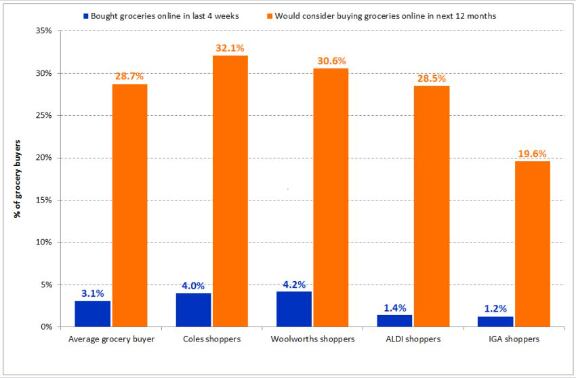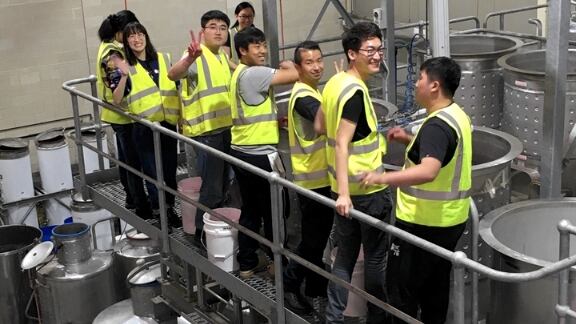Yet online grocery shopping remains niche in Australia, despite positive sentiments for the idea.
According to research data, almost a third of Australians say they plan to start buying their food shopping online, though only around 3% actually do so each month.
The question is, will the introduction of the AmazonFresh high-speed grocery delivery service change anything?
In the minds of established physical retailers like Woolworths, Amazon is a threat. The supermarket major has set up a task force to address the challenge the online grocer poses, knowing that its customers are marginally more likely to order their shopping online than those who mainly buy at Coles—and three times more likely than Aldi or IGA shoppers.

Coles, meanwhile, has its own concerns. Its customers are more likely to consider buying some of their groceries on the internet over the next year than those who mainly shop at the three big competitors.
But does this mean that the local supermarket scene is about to be destroyed? Not necessarily, according to a recent retail report by Roy Morgan Research, which highlighted certain trends that may well work in supermarkets’ favour, even once Amazon hits town.
It found that the long-standing gap between consumers who say they would shop for groceries online, and those who actually do so, suggests that immediate mass uptake of AmazonFresh is unlikely.
It also identified that Australians are making more visits to bricks-and-mortar stores, at least partly due to the growing trend towards “retailtainment”, whereby shopping experiences are being enhanced with an extra element of fun.
Savvy supermarkets have already been tapping into this concept with add-ons including in-store cafés, tastings and cooking demonstrations—elements an online grocery service cannot compete with in its current format.
“Online grocery shopping is not widespread in Australia yet, but the arrival of AmazonFresh looks set to up the ante with its quick-delivery, low-priced service,” said Michele Levine, Roy Morgan’s chief executive.
However, it is worth noting that customers who mainly shop at Coles or Woolworths are more likely than average shoppers to be technology early-adopters. As such they are more open to radical new e-commerce propositions like AmazonFresh.
But the American retailer’s disruptive threat is not just about technology; it’s about competitive pricing, service and real estate, added Levine.
“With heated price wars already characterising the current Australian supermarket scene, a new player of this magnitude will undoubtedly appeal to grocery shoppers, especially when Amazon CEO Jeff Bezos has already declared: ‘Your margin is our opportunity’,” she said.
As traditional supermarkets reduce the range of brands they stock in favour of a greater selection of home brands, the sheer diversity of goods available on AmazonFresh may also appeal to shoppers.
Still, the incumbent supermarkets have the advantage of physical locations within easy reach of shoppers.
Though Amazon is venturing offline, with its first cashier-less, bricks-and-mortar Amazon Go grocery store currently operating in beta-mode in Seattle, it remains some way off rolling out these stores in Australia.
“This advantage will buffer local supermarkets while they gauge and respond to the impact of AmazonFresh’s arrival,” Levine predicted.
More from Down Under…
Chinese now make up nearly half of Aussie university’s oenology places
One Australian university has seen an almost three-fold increase in Chinese enrolments in its winemaking courses over the past five years.

Adelaide University’s four-year Bachelor degree in oenology is regarded as among the most comprehensive of its kind in Australia. It also offers a postgraduate diplomas and Master’s courses.
Of the 280 students across the three courses, 114 are from—compared to just 44 who enrolled in 2013.
“That’s a significant change in five years,” said Paul Grbin, of the university’s School of Agriculture, Food and Wine.
“Our numbers have grown overall as well, so we are not getting fewer international students from our traditional markets, such as America, Canada, South Africa, South America and a few Europeans.”
Australia is the fifth largest wine-producing nation, making close to 1.3bn litres, compared to China’s sixth position with 1.15bn litres, according to the Organisation of Vine and Wine.
Despite China’s huge imported wine market, about 80% of the wine consumed there is produced domestically.
Dr Grbin added: “There’s definitely a sense when I talk to the students that there’s excitement around the development of the industry in China, and there are plenty of good opportunities for them when they graduate to work—not only in China but in the international wine trade.”
Postgraduate student Huiyi Hu came to Adelaide to gain more practical winemaking experience.
She said: “I studied winemaking for four years in China from 2010 but I didn't learn how to make real wine.
“Here I make my wine in a winery and solve any problems with group discussions, rather than just following instructions.”
The university has revealed plans to expand its teaching and research winery to cater for growing demand.
Chinese students accounted for almost 40% of the 32,000 international students who studied in Adelaide in 2015.
